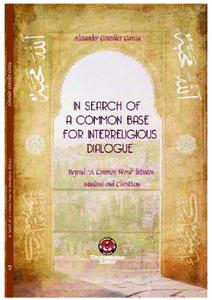In search of a common base for interreligious dialogue : beyond “a common word” between Muslims and Christians
Sinopsis
Religions are like musical instruments. To be played together in an orchestra, they must be tuned to the right tone or pitch. The first requirement is the desire to be in tune with the other instruments. The second one is to find a common reference or tone, usually given by the oboe that plays a fixed pitch (A = 440 Hz). Then all other instruments will be adjusted according to this common pitch using different methods because of the different ways in which sounds are produced. The task of interreligious dialogue, using this analogy, is to find that common reference or pitch that allow all religions to play together in peace and harmony. I found that the first requirement for tuning our religions is already present. Several important documents such as Nostra Aetate and A Common Word between Us and You are signs of a real desire for falling in the right pitch. However, religions are still searching for the second requirement, the pitch to which the whole orchestra will be tuned. This study hopes to contribute to this search by presenting a common pitch to which religions can tune themselves to build harmonious relations with each other, i.e., a common base for interreligious dialogue. The desire for a common base is expressed in the dialogue between Muslims and Christians, established by the Muslim text A Common Word between Us and You, (2007). Therefore, I shall focus my study on the documents of both religions expressing this idea. The first chapter presents an analysis of this relevant document. Muslim leaders and scholars suggest that meaningful peace can be brought about between Islam and Christianity because both traditions share a fundamental belief. This revolutionary initiative has been admired by many Christian leaders. Nevertheless, we will see that according to the analogy of the orchestra, A Common Word does not propose a universal pitch that will allow tuning all religions. I propose going beyond “A Common Word” between Muslims and Christians.The second chapter studies another proposal for a common universal base for interreligious dialogue. In several documents, the Catholic Church introduces the idea of natural law as a common base for all people because God has provided humanity with reason, leading people towards righteous behavior. Even though natural law has been criticized from several angles, I hold that it is still a valuable means to foster interfaith relations. The third chapter shows that the common bases for interreligious dialogue, as proposed by Muslims and Catholics, are worthy only if they push us to concrete actions that will enhance harmony among all people. Each proposal contains various ways of justifying righteous actions. However, in my perspective, those actions geared towards the respect for human dignity and the protection of fundamental rights are more important than the ways we use to justify them. I conclude by suggesting a universal and common universal pitch to which all religions can be in tune. The search for a common base for interreligious dialogue is an essential task for today’s society. Our cultures face extremes positions, deliberately avoiding or even demonizing religions other than theirs. Therefore, we urgently need to find a base where believers and non-believers can meet with each other to overcome the tensions among us, and where reconciliation can turn from hope into reality. Let us start with the Muslim proposal.



